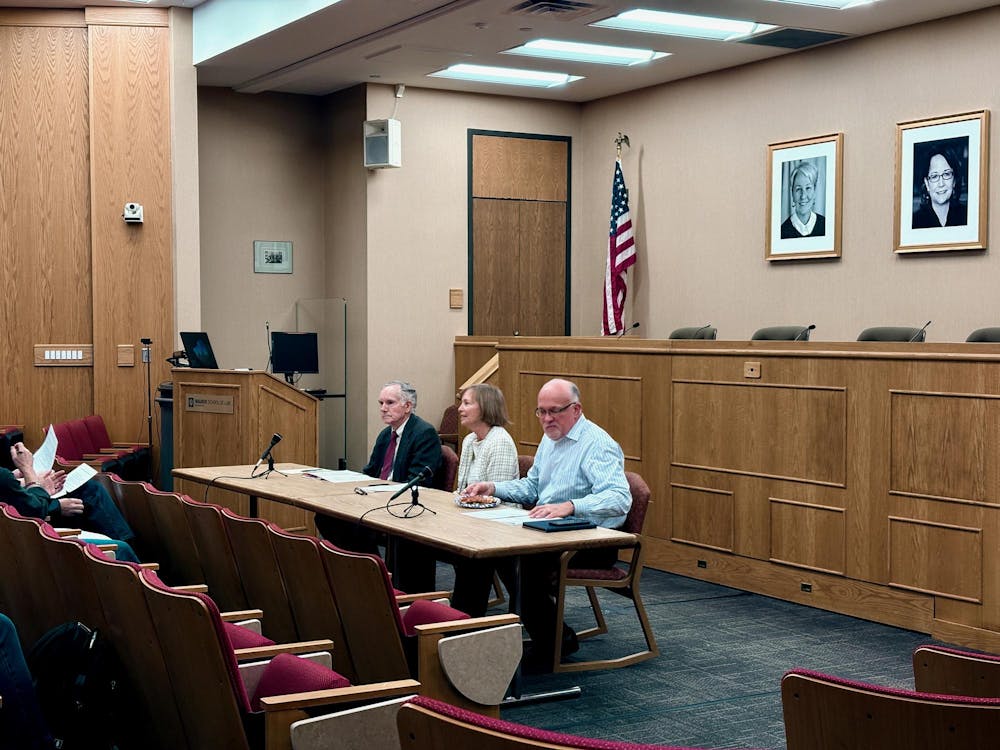Two of IU’s leading experts in First Amendment law and a member of the Board of Trustees participated in a panel discussion Monday and questioned the shaky constitutionality of the university’s expressive activity policies.
IU has been the target of litigation after the mass arrests of pro-Palestinian protesters in April at Dunn Meadow while professors and Board of Trustees members alike remain skeptical over the policy’s constitutionality.
Concerns over potential First Amendment violations were raised when IU amended its policy the day before the protests began and formally approved an updated expressive activity policy in July. This prompted a lawsuit from the American Civil Liberties Union in August.
Despite the Board of Trustees approving an updated and narrower version of the policy in November, for many, it still leaves many questions unanswered.
The version of the policy approved in July banned expressive activity between the hours of 11 p.m. and 6 a.m. and banned any sort of camping. The policy was updated this month to allow exceptions for university-approved events but did not provide any details as to what the university would theoretically permit or who would make the decision.
The policy does not provide definitions of key terms for what is considered expressive activity, including protesting and making speeches. It also allows IU community members to “spontaneously and contemporaneously assemble and distribute literature,” which is not given a definition.
“It’s not easy to draft a good policy,” Daniel Conkle, a professor of constitutional law at IU’s Maurer School said. The panel notably included Vivian Winston, a member of IU’s Board of Trustees, who voted against adopting the policies in July and November.
According to Winston, the board saw what happened at other universities across the country in the spring and believed something would need to be done to prevent potential violence. After the Indiana State Police were brought in to make arrests, and charges were dropped by the Monroe County Prosecutor based on dubious constitutionality of the change in policy, the board of trustees looked to officialize a new policy.
Precedented case law allows for universities and other public institutions to make reasonable restrictions on the time, place and manner of free speech, however, courts have demonstrated that the regulations must not be overly vague or broad and allow for ample opportunity for alternative methods of speech.
Winston said during the discussion she had serious issues with both versions of the policy, which she believes to be vague and overly broad. Winston also called into question the inconsistent enforcement of the policy, notably the camping that took place when ESPN College GameDay visited campus, where a woman was concussed after an individual threw a trash can into a crowd. The IDS has not independently confirmed the details of the incident.
Winston said no one was sanctioned during the events of College GameDay, but 20 out of 400 professors who joined the ongoing candlelight vigils protesting the expressive activity policy were sanctioned, despite no injuries being reported during the weekly protests. Winston believes this shows that the administration is not enforcing the policy in a viewpoint-neutral way, as required by public universities.
Conkle said that vague regulations like the expressive activity policy give way to “armchair enforcement,” where administrators make decisions that favor their interests. Winston said she proposed removing the rule requiring protesters to be further than 25 feet away from a university building, which was shot down by other board members. She believes this policy was specifically in place to stop protests in front of Bryan Hall.
Steve Sanders, the third panelist and constitutional law professor at IU, has been vocal in questioning the legal basis for the policies, and said he believes the policies’ vagueness is what led the American Civil Liberties Union to sue the university. Sanders used examples like an impromptu late-night gathering in Dunn Meadow in 1998 after the torture and murder of Matthew Shepard, a college student in Wyoming, which prosecutors argued was a hate crime motivated by Shepard’s sexuality.
Sanders said the policy, as it is written, does not clearly state whether such events would be considered protests.
“It looks like people are making it up as they go,” Sanders said. “The lawyering around this policy has been very bad.”
Winston described the Board of Trustees as stubborn and unwilling to listen to multiple concerns she raised about the policy.
“I see a Board of Trustees that is not curious, that does not ask the right questions,” Winston said.
Both Sanders and Conkle believe IU’s policy and similar policies at other universities will be on the cutting edge of First Amendment litigation. Sanders said the ACLU is retooling its complaint to accurately reflect the updated policy. The case is still pending.




